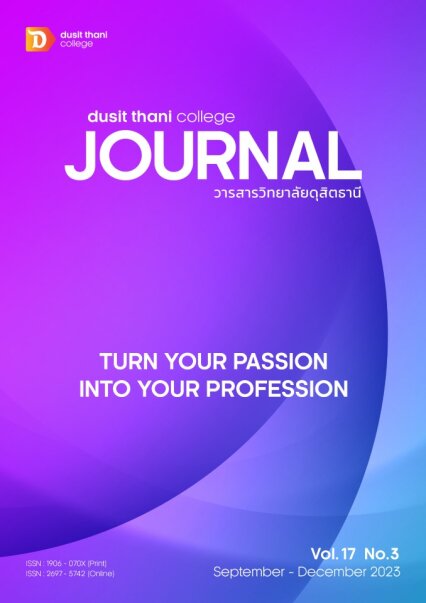Factors Relating on Future Career Intention in Culinary Arts of Students in Bachelor of Business Administration in Culinary Arts Dusit Thani College
Main Article Content
Abstract
The objectives of this study were: 1) to study factors related to the professional experience training expectations of students in Bachelor of Business Administration, majoring in Culinary Arts, Dusit Thani College 2) to study factors related to the experience gained from professional experience training of students in Bachelor of Business Administration, majoring in Culinary Arts, Dusit Thani College 3) to study factors related to job satisfaction gained from professional experience training of students in Bachelor of Business Administration program, majoring in Culinary Arts, Dusit Thani College and 4) to study the future career intention in Culinary Arts of students in Bachelor of Business Administration, majoring in Culinary Arts, Dusit Thani College. The sample group consisted of 400 third-year students in the Culinary Arts program who had completed professional experience training and analyze statistical data by finding frequency, percentage, mean, standard deviation, and test the hypothesis using the Multiple Regression Analysis by using the Enter method. The results of the study found that the expectations for professional experience training, and experience that gained from professional training and satisfaction with professional training experiences is a factor relating on future career intention to enter in Culinary Arts of students in Bachelor of Business Administration, majoring in Culinary Arts Dusit Thani College statistically significant at the 0.05 level with a multiple correlation coefficient (R) equal to 87.6 percent and an Adjusted R Square value equal to 76.7 percent, with influence values in raw form equal to 0.469, 0.202, and 0.254 and influence values in standard score form equal to 0.534, 0.189, 0.247, respectively, and the equation can be written as follows: Y = 0.256 + 0.469 (Expectations in professional experience training) + 0.202 (Experience received from professional experience training) + 0.254 (Satisfaction in training professional experience)
Article Details

This work is licensed under a Creative Commons Attribution-NonCommercial-NoDerivatives 4.0 International License.
Article Screening Policy
- All research and academic articles to be published must be considered and screened by three peer reviews in the relevant field / article.
- All articles, texts, illustrations and tables published in the journal are the personal opinions of the authors. Editors don't always have to agree. And no responsibility whatsoever is the sole responsibility of the author.
- The articles to be published must never be published. Where did you first publish? And not in the consideration of other journals If the audit found that there has been a duplicate publication It is the sole responsibility of the author.
- Any article that the reader sees as being plagiarized or impersonated without reference. Or mislead the work of the author Please let the journal editor know it will be your greatest blessing.
References
Choudhary, R. (2021). Perception of Hotel Management Student’s Towards Working in Hotel Industry. ANVESAK. 51(1), 28-34.
Cochran, W.G. (1953). Sampling Techiques. New York: John Wiley & Sons, Inc.
Cronbach, L. J. and Furby, L. (1970). How we should measure" change": Or should we?. Psychological Bulletin. 74(1), 68.
Husainah, N., Hafnidar, S., and Limakrisna, N. (2022). Determinants of Self-Efficacy to Generation Z Job Satisfaction. Journal of Positive School Psychology.5(6), 850-860.
Insawang, W.P. and Jaroenwisan, K. (2023). A New Perspective in Human Resource Management in the Hotel Business: Generation Z Worker. RMUTI Journal Humanities and Social Sciences. 10(1), 67-78.
Khaosaard, W. (2018). The Cooperative Education Effectiveness: A Case Study of higher Education in Thailand. Journal of MCU Social Science Review. 7(3), 206-218.
Marinakou, E. (2020). Hotel Internship and Student Satisfaction as Key Determinant to Career Intention. Journal of Tourism Research. 25, 42-67.
Mashuri, M.A., and Patah, M.O.R.A. (2020). Future Culinary Students’ Career: Do Internship Program Experiences Make a Difference? Journal of Tourism, Hospitality, and Culinary Arts. 12(2), 128-143.
Nuansri, A., Yasuttamathada, N., and Heng, W. (2017). Factors in Choosing Career of the 4Th Year Students of Bachelor of Arts Chinese Program Rajabhat Maha Sarakham University. Chophayom Journal. 28(1), 115 – 123.
Punnasirisakul, P. (2016). Satisfaction on the Curriculum and Occupation Expectations of the 4 Fourth Year Students, School of Culinary Arts, Suan Dusit Rajabhat University. Journal of Humanities and Social Sciences Valaya Alongkorn. 11(2), 167-175.
Rovinelli, R. J., and Hambleton, R. K. (1976). On the Use of Content Specialists in the Assessment of Criterion-Referenced Test Item Validity. In Paper presented at the Annual Meeting of the American Educational Research Association (60th), San Francisco, California, April 19-23, 1976.
Sulong, S. N., Mohamad, N. H., Ahmad Shariff, S. N. F., Arifin, A., and Abdul Manap, M. S. (2021). Culinary Students’ Career Intention in The Hospitality Industry: The Importance of The Work Environment During Practical Training. Jurnal Intelek, 16(2), 29-36.
Taweepol, R., and Phasunon, P. (2015). The Affecting Factors on Student’s Anxiety in Majoring Hotel Management, Silapakorn University. Thai Science and Technology Journal. 23(5), 720–730.
Thailand Development Research Institute. (2021). COVID-19 Crisis in the Youth Group Unemployment-Out of Education: Problems That Have Not Been Addressed by the State. Retrieved from: https://tdri.or.th/2021/10/the-neet-generation-at-the-age-of-covid-19/
Unguren, E., and Huseyinli, T. (2020). The Moderating Effect of Student Club Membership on the Relationship between Career Intention in the Tourism Sector and Post-Graduate Employability Anxiety. Journal of Hospitality, Leisure, Sport and Tourism Education. 27, 100265.
Work Point Today. (2022). Labor Shortage Tourism Survey Results during the High Season of 2022, recovering quickly after the COVID-19 crisis. Retrieved from: https://workpointtoday.com/tourism-industry/


